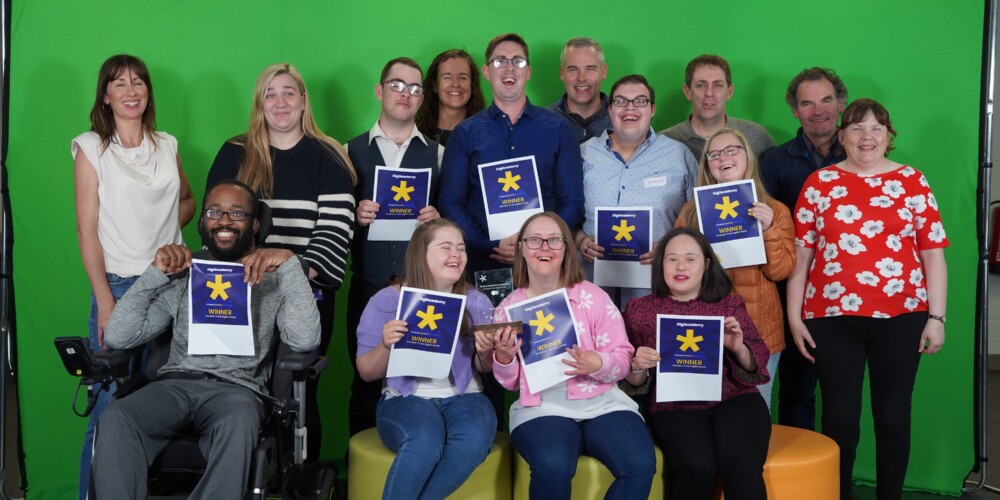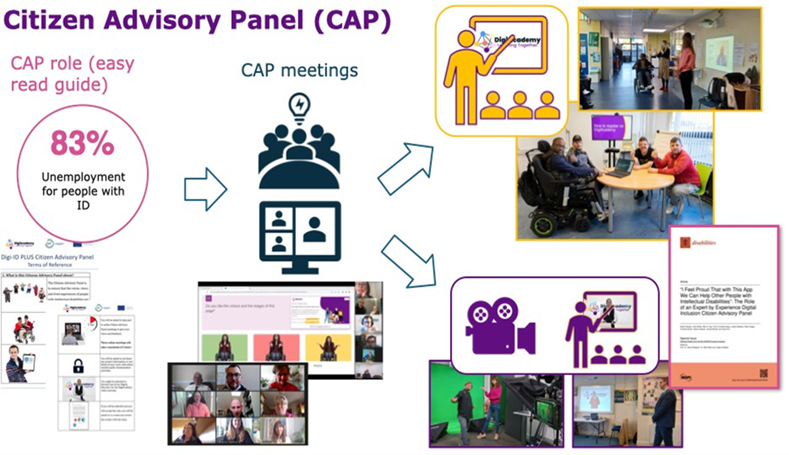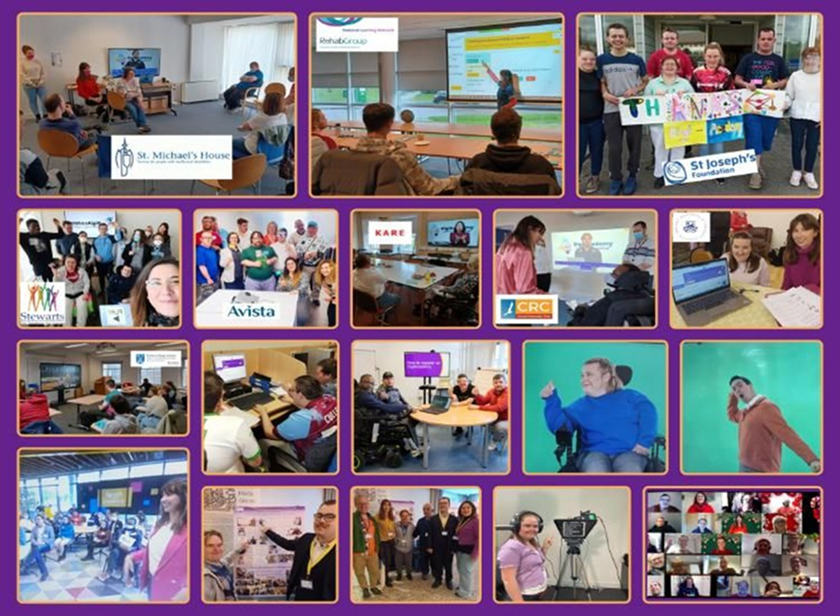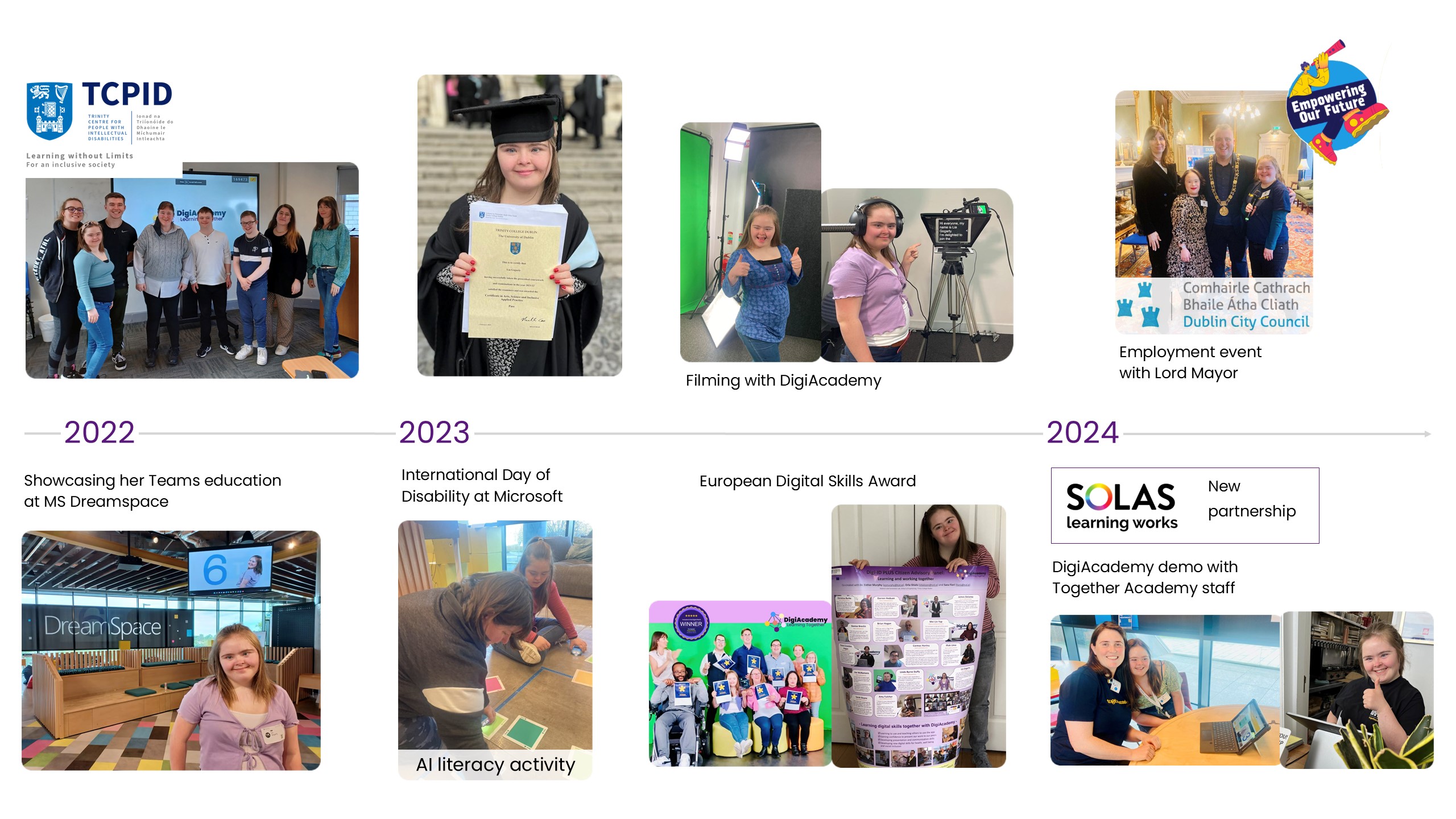
Find information on how to make a Protected Disclosure under the external procedures in place in the HEA.

Empowering learners with intellectual disabilities (ID) – Inclusive education and employment pathways
DigiAcademy is a nationwide collaborative initiative led by Principal Investigator Dr Esther Murphy, (School of Engineering/ADAPT Research Centre), with the support of Professor Vincent Wade, Dean of Undergraduate Studies at Trinity College Dublin, Professor Michael Shevlin, Chair of Inclusive Education, multiple TCD Schools and with the guidance and advice of the Citizen Advisory Panel (CAP), which comprised 14 individuals with intellectual disability/autism. The CAP recruitment is supported by the National Federation of Voluntary Bodies, an umbrella organization representing 57 disability providers. The diverse age, gender, socioeconomic background, and digital competency of its members support programme design and oversight that is inclusive, representative, and enriched by a variety of insights.
DigiAcademy’s purpose is to address the societal challenge of digital access and social inclusion for people with intellectual disability – the most digitally disenfranchised community in Irish society. We aim to promote digital literacy to these individuals, a core competency for their future education and employment opportunities.
The programme has been implemented by Trinity College Dublin (TCD), Education and Training Boards, disability non-governmental organisations (AVISTA, in Dublin, Limerick), social enterprises (e.g. Together Academy), employers and carers, and is currently being deployed by other HEIs including University of Galway.

Figure 1: Citizen Advisory Panel
Design and delivery of bespoke digital literacy programme by people with an ID for their peers
Embedding inclusive employment opportunities and co-creation practices from the outset of this initiative, we established a globally first of its kind paid citizen advisory panels to inform and co-create both the research and educational programme and to train as our programme teachers.
The structure and content of the DigiAcademy programme is grounded in research and employs a learner-centred design methodology. We undertook ethical research exploring access barriers to technology use, digital skills learning, social inclusion, and employability amongst both Irish and European communities of people with intellectual disabilities (including Netherlands, France, Sweden, and Croatia). To support this, the DigiAcademy team, including CAP members, co-designed accessible ‘Easy Read’ research programme protocols, information packs (including informed consent documents for participation in co creation focus groups), survey instruments and user testing.
Based on the research findings the DigiAcademy team including CAP members:
DigiAcademy resources were made available to individuals supported by participating organisations around the country via the accessible online learning platform. Modules on workplace related competencies, such as presentation and team building skills, were also delivered through the platform with the aim of increasing learners’ confidence and readiness to pursue job opportunities and succeed in workplace environments.
Since its inception, DigiAcademy has expanded in scope in response to evolving needs. For example, the digital literacy programmes were adapted to include text-to-speech functionality to enable individuals with sight loss to fully access this content. The programme has also expanded beyond foundational digital skills to incorporate emerging topics such as AI literacy and online safety, ensuring that learners stay equipped with relevant and up-to-date knowledge.
Dissemination of DigiAcademy resources nationally and internationally
Inclusive education events, coordinated by TCD, facilitated formation of new connections with Education and Training Boards, other higher education institutions and employers. Regular multistakeholder events on inclusive education were held to disseminate research findings and promote the digital skills online platform to existing and potential partner organisations.

Figure 2: Initiative’s education and employment events and activities
The DigiAcademy initiative has achieved significant national reach, providing digital skills resources to over 13,000 individuals across multiple disability service provider organisations, including St Michael’s House, Avista, Stewarts Care Services, Brothers of Charity, KARE, National Learning Network, St. Joseph’s Foundation, the Central Remedial Clinic (CRC), and the Trinity Centre for Persons with Intellectual Disabilities (TCPID).
A free beta version of the online platform, DigiAcademy, was also disseminated internationally, including through EU partner networks with the Karolinska University and University of Zagreb.
Monitoring of results shows significant positive effects on a number of learner outcomes:
The following individual case studies illustrate some of the significant, transformative benefits experienced by DigiAcademy’s participants:
Amy, a 27-year-old woman with Down Syndrome, struggled in mainstream school before transitioning to disability service with hope to find meaningful employment. She was recruited to the DigiAcademy team in 2022, building strong digital and communication skills and becoming more independent in all aspects of her life. She stated that “I love my job with DigiAcademy. I teach people with disabilities and even their teachers, to learn about technology.” Later she secured a part time administrative opportunity Masterlink, and her employer commented: “Amy has a strong work ethic and manages sensitive data with incredible professionalism.”
Impact Case Study: Amy Fulcher

James, a 25-year-old man with an intellectual disability, joined the DigiAcademy team in 2021, as one of the most digitally disenfranchised CAP members, he had very limited digital skills and communication difficulties. After his participation in the programme and development in digital and communication skills, he became a highly competent teacher. He facilitated digital skills to 40 of his peers who have an intellectual disability and achieved his goal of moving from a dishwashing role in the hotel to front desk. His employer observed that: “James is a valued member of our team, and we look forward to his continued growth with our organization.” James shared: “Before I didn’t have email I felt left out of things. I can’t believe I teach others now and have developed new courses about staying safe online. I am much more confident talking to other people, and I love helping others.”
Impact Case Study: James Delaney

Lia, a 24-year-old student with Down Syndrome, participated in cocreation and user testing workshop at Trinity Centre for People with Intellectual Disability (TCPID) in 2021. After receiving training, she delivered the digital literacy programme to her peers with an ID, showcasing her teaching skills. She is currently a trainee at Together Academy and works in the café, her employer highlights: “She is always punctual, and she has created engaging content for our social media. Lia is an absolute asset to our business.” Lia commented: “I really enjoy collaborating in the DigiAcademy team, coming up with new ideas. I am part of the team helping Together Academy trainees to get started. I love seeing people’s faces when they see I’m their teacher.”
Impact Case Study: Lia Gogarty

Initial collated research on people with intellectual disabilities within national and international contexts indicated that one in two people with an ID have difficulties to communicate with health and education professionals, shaping the “train-the-trainer” model of the initiative. This is a very effective model for the development of highly competent trainers uniquely positioned to build digital capacity within their communities. Additionally, the “train-the-trainer” model not only generates employment opportunities for the trainers but also facilitates replication both nationally and internationally.
Research we conducted also corroborated the need to improve access and use of technology among people with intellectual disabilities as a key element for social inclusion and employability. Building on these insights, the initiative not only capacitated people with intellectual disabilities in digital literacy but also empowered them to become advocates for greater social inclusion, shaping employment opportunities for themselves and others. To tackle the significantly lower access to and rate of technology engagement for this community and drastically lower employment rate, the initiative unlocked the talent of those with some basic skills, by training them further to include transversal skills applicable to a work environment, while also inspiring their ambition through the ‘see and be it’ ethos of peer support.